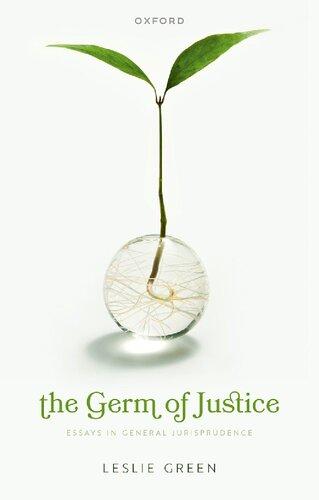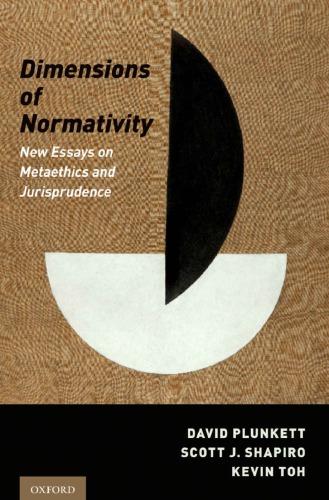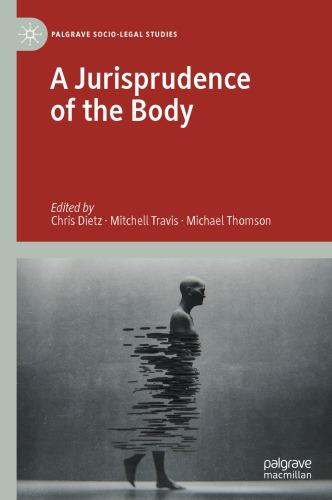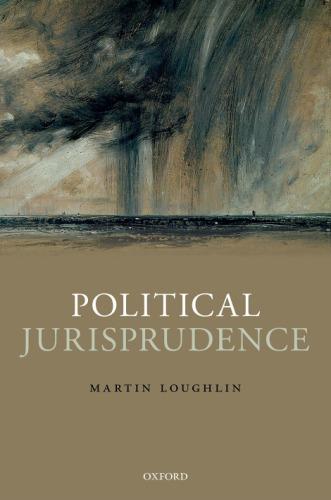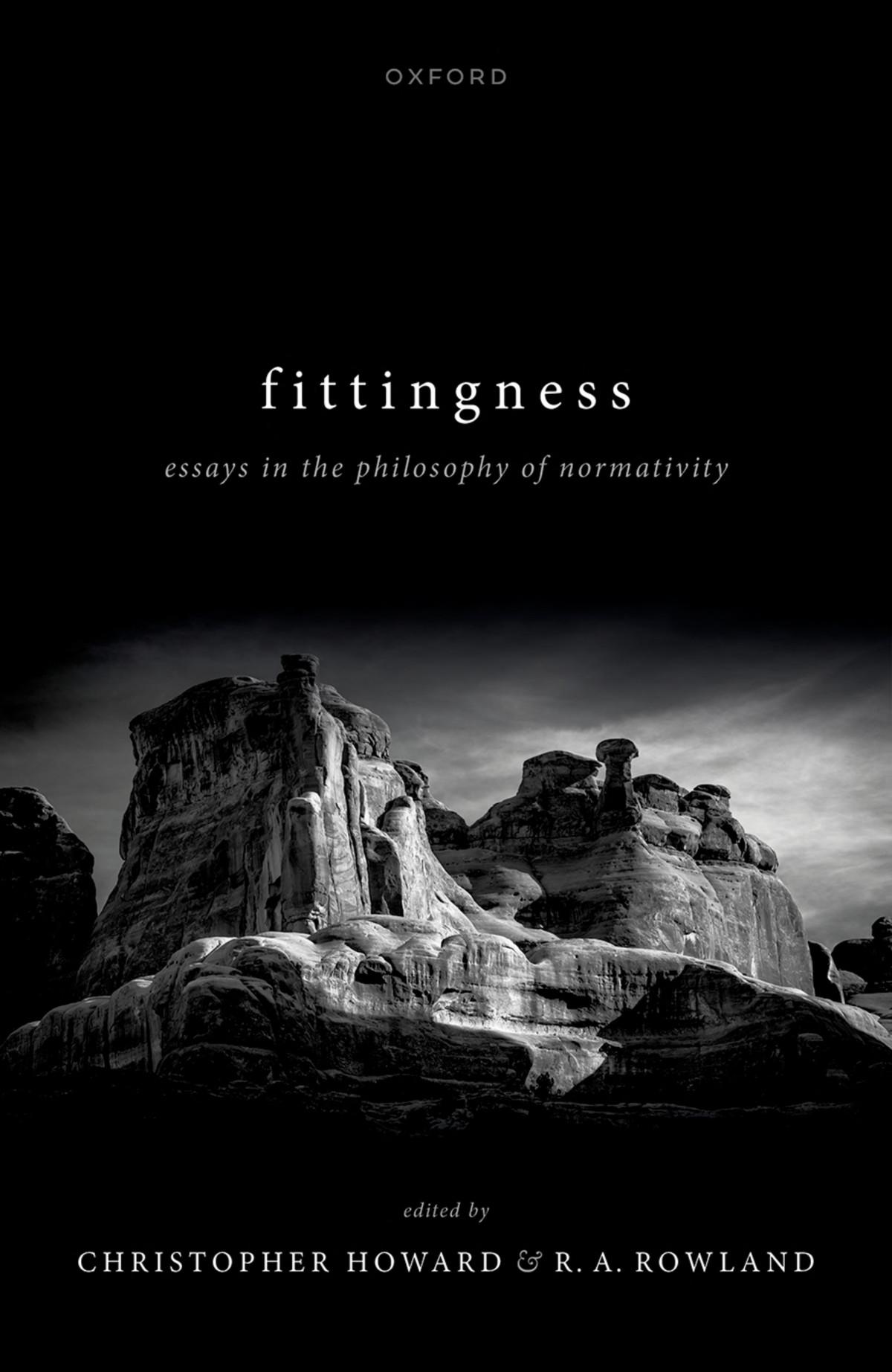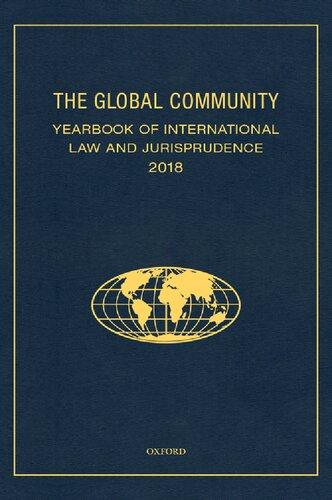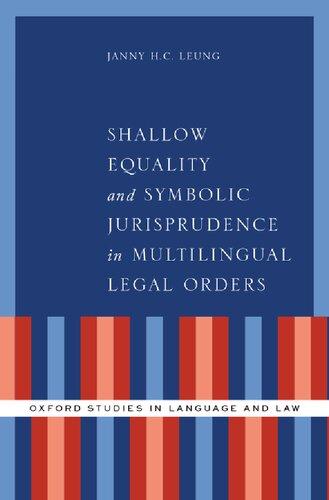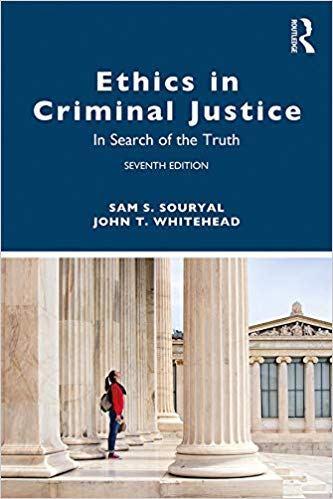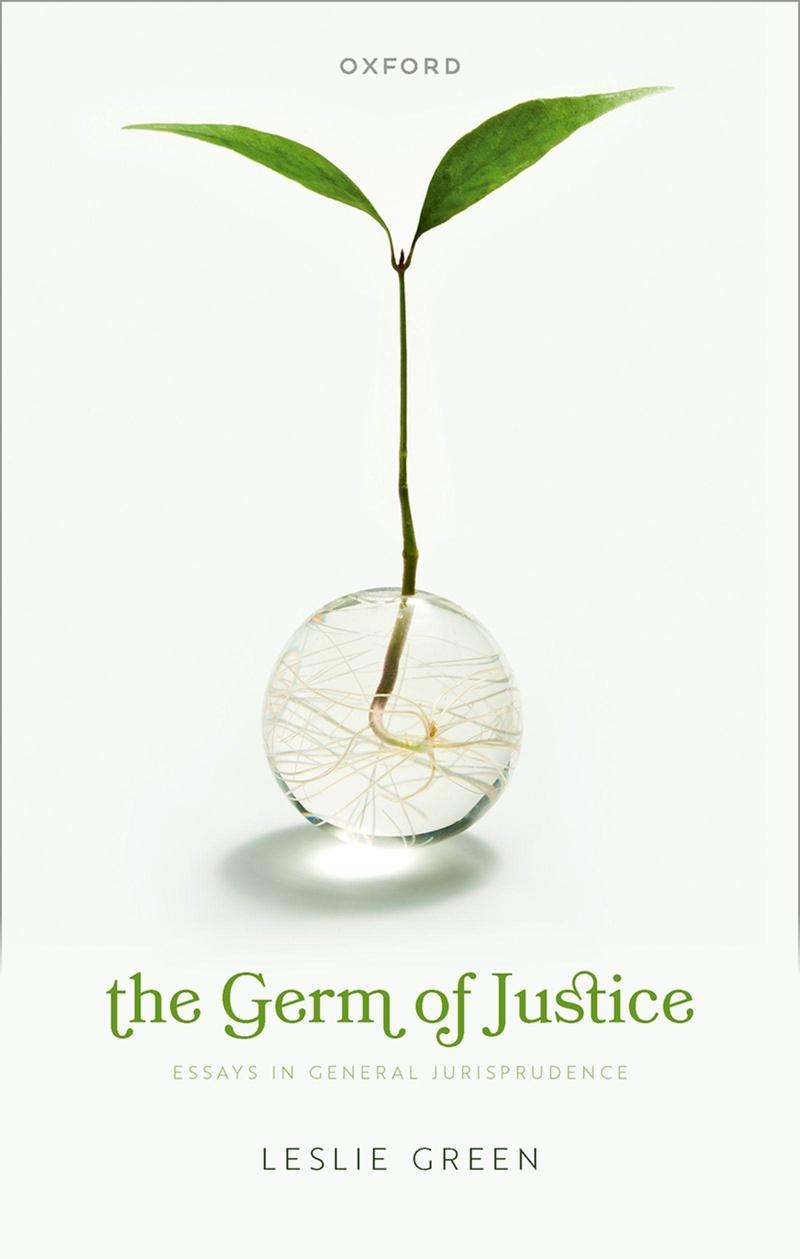The Germ of Justice
Essays in General Jurisprudence
LESLIE GREEN
Great Clarendon Street, Oxford, OX2 6DP, United Kingdom
Oxford University Press is a department of the University of Oxford. It furthers the University’s objective of excellence in research, scholarship, and education by publishing worldwide. Oxford is a registered trade mark of Oxford University Press in the UK and in certain other countries
© Leslie Green 2023
The moral rights of the author have been asserted
First Edition published in 2023
All rights reserved. No part of this publication may be reproduced, stored in a retrieval system, or transmitted, in any form or by any means, without the prior permission in writing of Oxford University Press, or as expressly permitted by law, by licence or under terms agreed with the appropriate reprographics rights organization. Enquiries concerning reproduction outside the scope of the above should be sent to the Rights Department, Oxford University Press, at the address above
You must not circulate this work in any other form and you must impose this same condition on any acquirer
Public sector information reproduced under Open Government Licence v3.0 (http://www.nationalarchives.gov.uk/doc/open-government-licence/open-government-licence.htm)
Published in the United States of America by Oxford University Press 198 Madison Avenue, New York, NY 10016, United States of America
British Library Cataloguing in Publication Data
Data available
Library of Congress Control Number: 2023935120
ISBN 978–0–19–288694–1
DOI: 10.1093/oso/9780192886941.001.0001
Printed and bound in the UK by TJ Books Limited
Links to third party websites are provided by Oxford in good faith and for information only. Oxford disclaims any responsibility for the materials contained in any third party website referenced in this work.
To Denise Réaume
Preface
This is a selection of my essays in general jurisprudence—the theory of law ‘as such’, or law ‘in general’. I have chosen papers that, I hope, make some progress on the problems they address, or at least clarify what needs to be done before progress is likely. The Introduction that follows says more about jurisprudence as I see it, and more about progress.
The influence of H. L. A. Hart, Joseph Raz, and, more remotely, Hans Kelsen will be evident on almost every page. I have sometimes rejected their conclusions about law, but I usually look to them for leads about how to start thinking about a problem. Sometimes I found that I had to start over, but starting over can be influenced by how one started.
In selecting these papers, I took advice from John Gardner, with whose early death I lost a co-teacher of twelve years, a model colleague, and a beloved friend, and from Brian Leiter, another great friend and a generous interlocutor for more than two decades. Alex Flach of Oxford University Press tried to cajole me into publishing such a collection long before I got around to it. Other projects intervened (including other projects that Alex cajoled me to undertake) but I was eventually worn down. My thanks also to Jordan Burke, who saw the project through to completion.
I have tried to acknowledge the help of those who invited, replied to, criticized, reviewed, or influenced these papers in the final footnote to each chapter. But here I want to single out for special thanks the following people in whose company I had the privilege of many enjoyable and illuminating hours talking about jurisprudence: Tom Adams, Farrah Ahmed, Matthias Brinkmann, Luís Duarte-d’Almeida, James Grant, Kate Greasley, Asif Hameed, Chris Hinchcliffe, Sam Kukathas, Maximilian Kiener, Hafsteinn Kristjánsson, Patrick O’Brien, Adam Perry, Basil Salman, Robert Simpson, Harrison Tait, Leah Trueblood, Charles Tyler, and Matt Watson, among others. I learned more from them than any of them learned from me.
This book was completed in the face of a grave threat to my life. Without the support of the ALS Clinic at Sunnybrook Hospital, Toronto, of Dr Peter
DeRoche of Mount Sinai Hospital, and of kind friends, I could not have finished it.
Once again, Denise Réaume got more than she bargained for. She has made it not only possible but worthwhile for me to keep going.
Leslie
Green Oxford 27 November 2022
Acknowledgements
The following chapters draw on papers originally published as indicated below. I thank the editors and publishers for permission to reuse that material here, usually with some changes. Parts of Chapter 1 also find their way into the Introduction to the third edition of H. L. A. The Concept of Law (Oxford University Press 2012), but that Introduction also contains other material, and it reflects some changes in my views since Chapter 1 was written.
1. ‘The Concept of Law Revisited’ (1996) 94 Michigan Law Review 1687.
2. ‘Law as a Means’, in P. Cane ed., Hart-Fuller: 50 Years On (Hart Publishing, 2009) 169–88.
4. ‘Positivism, Realism, and the Sources of Law’, in P. Mindus and T. Spaak eds, The Cambridge Companion to Legal Positivism (Cambridge University Press, 2021) 39–60.
5. ‘Gender and the Analytical Jurisprudential Mind’ (2020) 83 Modern Law Review 893.
7. ‘Positivism and the Inseparability of Law and Morals’ (2008) 83 New York University Law Review 1035.
8. ‘The Morality in Law’, in L. Duarte d’Almeida, J. Edwards, and A. Dolcetti eds, Reading HLA Hart’s ‘The Concept of Law’ (Hart Publishing, 2013) 177–207.
9. ‘Law and the Role of a Judge’, in K. Ferzan and S. Morris eds, Legal, Moral, and Metaphysical Truths (Oxford University Press, 2016) 322–41.
10. ‘Should Law Improve Morality?’ (2013) 7 Criminal Law and Philosophy 473.
11. ‘Hume on Authority and Opinion’, in D. Butt, S. Fine, and Z. Stemplowska eds, Political Philosophy, Here and Now: Essays in Honour of David Miller (Oxford University Press, 2021).
12. ‘Associative Obligations and the State’, in L. Green and A. Hutchinson eds, Law and the Community (Carswell, 1989) 93–118.
13. ‘The Forces of Law: Duty, Coercion, and Power’ (2016) 29 Ratio Juris 164.
14. ‘The Duty to Govern’ (2007) 13 Legal Theory
I. LAW, AS SUCH
A Philosophy of Legal Philosophy
1. This Book
These essays in legal philosophy treat problems of general jurisprudence, that is, the theory of law as such: questions relevant to Canadian law as much as Czech Law, to canon law as much as customary law. I hope they make progress on the issues they discuss. But I have also chosen them in the hope that they will be within the reach of students of law, philosophy, or politics who are theoretically inquisitive but may have no prior grounding in the subject. I therefore tried to ensure that most are free-standing and avoid unnecessary technicalities, so that others may not only to only eavesdrop on, but join in, these conversations in legal theory.
The title essay (Chapter 6) was intended to be my inaugural lecture as the Professor of the Philosophy of Law at Oxford, in 2007. It examines the relationship between applying law and achieving justice. The lecture was never given. It was postponed, first owing to family tragedy and then by other pressing priorities. Time passed until giving it as an ‘inaugural’ would have been incongruous. So, years after the paper was written, I revised it for first publication here. In compensation I let it have the limelight, if only titular.
Some of these essays have descriptive and conceptual concerns: the nature of law, the role of coercion in law, gender in law and jurisprudence, the relations between law and morality. Others focus on values: how should law be applied, how should judges do their jobs, what is law’s contribution to morality, what entitles some to rule or obligates others to obey? Though wide ranging, the essays do not cover the subject. Nor do they add up to a jurisprudence, if that means a compact set of ideas from which may be derived answers to the main problems of legal theory. I do not believe there can be such a jurisprudence. Repeated attempts to distil a theory of law from a few diaphanous propositions about freedom and equality, or sovereignty
and sanctions, or meaning and metaphysics, have always failed, and the time has come to stop doing the same thing over again while expecting a different result. We must work in a modular way. If we can deepen our understanding of questions about law in general, ensuring our answers are consistent with each other and with what we already know, that is enough. At any rate, it has been my approach.
These pieces do nonetheless belong to a tradition of understanding law developed and elaborated by Hume, Bentham, Austin, Kelsen, Hart, Raz, and many contemporaries who hold, as I do, that all law is positive law. Legal positivism, in this sense, is the idea that the basis of law is entirely social. All law is the creation, whether intentional or accidental, planned or chaotic, of ordinary, dateable, human thought and action. Nothing is law merely because it would be reasonable, fair, efficient, or even logical for it to be law; everything that is law is law because it was made in a way that is recognized as making law. I believe the ‘sources thesis’, as Joseph Raz dubbed it, is part of any adequate theory of law.1 I do not demonstrate that thesis. (Few interesting ideas in legal philosophy admit of demonstration.) Happily, jurisprudence makes progress—in ways I will explain—and I am relieved that others have done about as much as we can, for now, to make the sources thesis plausible. If these essays contribute to our confidence in legal positivism, they do so by clarifying what that approach commits us to, detaching it from certain common errors, and showing how key problems in legal philosophy have solutions that conform to it.
Chapter 2 comes closest to a résumé of my own view. It begins with Hans Kelsen’s idea that ‘law is a means, a specific social means, not an end’. It takes work to unpack that slogan. What is Kelsen denying? No one holds that law itself could literally be ‘an end’. Whose end? On the other hand, all law that is deliberately created is made with some end in view, if only to repeal or consolidate legislation. I think we can go further. Law is constitutively oriented to certain ends. We cannot distinguish a system of legal rules from the rules of a game without attending to who and what the rules aim to regulate, and why. I return to this issue in Chapter 7 in studying some connections between law and morality and then single it out for focused attention in Chapter 8, where I criticize H. L. A. Hart’s claim that the necessary content of law is fixed by what it takes for a society to survive or for law to enjoy voluntary compliance. I argue instead that positive law has features that make it apt for supporting morality, and that is how law must be used by people like us, in
1 Joseph Raz, The Authority of Law (Oxford University Press, 1979) chap. 3.
our circumstances, with our needs. That is just one of several ‘necessary connections’ between law and morality, in one sense of ‘necessary’.
How do I square the idea that law has constitutive ends with my vote in favour of Kelsen’s proposal that law is a means? Nothing is a legal system unless it aims at regulating violence, but other things also have that aim, and even have it constitutively. (The World Peace Association, for example.) So we cannot identify law by reference to its aims, even though there are aims law must have. We cannot identify law without considering how it goes about its constitutive aims, and that is the sense in which law is a ‘specific social means’ and not ‘a [set of] ends’.
Law’s means have a special institutional complexity, however, which Kelsen oversimplifies. He says law is essentially and entirely a system of coercive norms, an idea shared by legal philosophers from Jeremy Bentham to Ronald Dworkin. It is also a view that resonates with common-sense ideas about law. I air doubts about it in various places and bring them together when considering Frederick Schauer’s claim that law is in fact mostly coercive and there is no point in debating whether coercion is an ‘essential’ feature of law or not (Chapter 13). Like some other contemporary legal theorists (including those discussed in Chapters 4 and 5), Schauer distrusts ‘conceptual analysis’ and wants more attention paid to empirical evidence. I think jurisprudence is already attentive, for it is the facts that show that law is a site of coercive force and also that some laws coerce no one. In principle, there could be legal systems in which all laws were like that. Only the final (‘in principle’) point depends on something more than coercion-counting. I hold that it is a necessary feature of legal systems that they can provide for coercion (when necessary) but not that they always do provide it. Law has other means at its disposal, including the creation of duties and duty-related norms and the ability to harness extra-legal, social power to its ends. These facts are perfectly familiar. Then why expend philosophical energy nit-picking about what is necessary to law, or about the precise differences between coercion, duty, and power? It promises a deeper understanding of familiar facts about law. That is the aim of general jurisprudence, and deepening our understanding is, I will suggest, one of the marks of progress in the subject.
2. Other Books
Not all law is found in books, and neither is all jurisprudence. But much of it is, and any approach to jurisprudence involves the study of books. A course
in jurisprudence sends students to a library—be it analogue or digital— rather than to a courtroom, laboratory, or kitchen.2 If they are lucky, they will read Aristotle, Aquinas, Bentham, Austin, Kelsen, Hart, Dworkin, Raz, and other giants of the subject. In this book, I spend a lot of time in the company of other books, but not as authorities or as objects of intellectual history. I am looking for clues about how to approach some problems of general jurisprudence.
In the Anglosphere, no book of legal theory has proved more clue-filled than H. L. A. Hart’s The Concept of Law, first published in 1961. I introduce leading ideas from that book in Chapter 1, so that might be a point of entry to these essays. Hart found his own clues to legal theory in the works of Bentham, Austin, and Kelsen, but he was diffident about this. The Concept of Law is lax in its scholarly apparatus, and it buries important elaborations and qualifications in notes at the end, which, Hart says, the reader may consider or ignore at will.3 Here is his justification for that set-up:
I hope that this arrangement may discourage the belief that a book on legal theory is primarily a book from which one learns what other books contain. So long as this belief is held by those who write, little progress will be made in the subject; and so long as it is held by those who read, the educational value of the subject must remain very small.’4
In this Introduction I want to explore three injunctions implicit in that passage:
• legal theory should be more than ‘books about books’;
• legal theory should aim to make progress; and
• legal theory should be of educational value.
These points do not amount to a jurisprudential methodology, but in the popular sense of ‘philosophy’—a general attitude or approach to work and life—they do express a philosophy of the philosophy of law. Before we can
2 On the supposed relevance of diet to jurisprudence, see Jerome Frank, Law and the Modern Mind (Tudor, 1936) 137. Frank does not, however, provide the reader with any recipes that might make for healthier judicial decisions.
3 These are Hart’s discursive notes that appear between 277 and 308 in the third edition (H. L. A. Hart, The Concept of Law (3rd edn, Penelope A. Bulloch and Joseph Raz, eds; Leslie Green, intro, Oxford University Press, 2012)). The scholarly and bibliographic notes between 309 and 325 were written by me with the help of Tom Adams.
4 Hart, The Concept of Law, vii.
examine that, however, we need to consider a more basic presupposition on which those injunctions rest: that there is something to learn about law ‘in general’, that general jurisprudence can succeed or fail at understanding the nature of law as such.
3. Choices
Problems in general jurisprudence often begin with, or take us back to, fundamental questions about the nature, or ‘definition’, of law. But some scholars hold that law in general is a thing without a nature (or, perhaps, that it is a thing whose nature is to have an indeterminate nature). The set of things we intelligibly call ‘law’ is a purely nominal kind, and no analysis can pin down all the things to which it applies in a way that we might think of as plausible or correct. If there is nothing to get right in general jurisprudence, there is also nothing to get wrong. And if that is so there is no focus for the subject, nor any serious prospect of making progress in it, or finding value in it.
Ideas like this often turn up in debates about the relations between law and morality (for example, in the arguments in Chapter 9). Some writers hold that if no empirical considerations settle such questions, there is nothing else to go on and we might as well stipulate a ‘definition’ of law to suit some extrinsic purpose: a definition that is uplifting, or profitable, or intellectually stimulating. In thus ‘choosing a concept of law’ we might, for example, think of seriously unjust laws as non-laws, or as valid laws that are seriously unjust, or as marginal or defective law-specimens, or as punishments for original sin. There is no fact of the matter, empirical or conceptual: the decision falls within our inalienable freedom to choose concepts.
Theorists of starkly different outlooks have been friendly to such ideas.5 It is not so clear what they have in mind. There is no doubt that vague concepts can be sharpened in various ways or that some socially prevalent concepts, such as race, should not be used and that others, such as gender, should be reformed. If this is ‘choosing concepts’, then fair enough. But all such
5 Among the philosophers considered here, Brian Leiter and Frederick Schauer propose choosing a concept of law with an eye to predictive, empirical concerns. Others, including Ronald Dworkin, John Finnis, Michael Moore, Liam Murphy, and Jeremy Waldron prefer that we guide conceptual choices by moral or political considerations. See Philip Soper, ‘Choosing a Legal Theory on Moral Grounds’ (1986) 4 Social Philosophy and Policy 31. (Contrary to rumour, this is not the point of Hart’s remarks about the ‘broad’ concept of law: see Chapter 1, section 5, this volume.
interventions presuppose that there is a concept of some shape on which to operate. If there isn’t, the idea of choice is inapposite. We only choose when, for some (adequate if not exigent) reason, we select an option from a choiceset. If there were no constraints, how could we know what options are in that set? Moreover, if legal theory is a matter of ‘choosing concepts’ why should it fall to jurisprudence to do it? Why not turn the definition of law over to the anthropologists or poets to decide and then just work with whatever they hand us?6
Perhaps concept-choosers see themselves as legislators. It is certainly one of law’s functions to provide authoritative guidance by drawing lines where we need them. Suppose a constitution says that human rights are subject only to such reasonable limitations as are ‘prescribed by law’. That legal system had better tell us whether, for constitutional purposes, ‘law’ includes only statute, or whether rights may also be limited by common law or administrative regulation. Different constitutions with similar provisions may define ‘law’ in different ways, depending on the list of rights they include, the constitution’s structure, and local presuppositions about legitimacy. But these legally important chores have little philosophical importance. If Canadian law were to hold that Indigenous law is not really law, it would be of no more jurisprudential interest than if Canadian law were to hold that American law is not really law. The theoretical question ‘What is law?’ is not a legal question and its answer cannot be found in statute or case law.
Some find the source of their conceptual powers not in legislation but in science. According to ‘naturalism’, philosophy should adopt the methods of the empirical sciences which, some say, learn nothing from ‘conceptual analysis’. Into that vacuum rushes whatever definition of law proves useful to the ‘successful’ sciences of society.7 If ‘law’ turns out to have no scientific use, it should go the way of phlogiston. It all depends, then, on our criteria for scientific success. If it is a black-box power to predict and control behaviour, law will be one thing; if it is to provide an explanatory account of social reality, law will be another. Maybe we get to choose the criteria for success, too. But
6 ‘Yet law-abiding scholars write:/ Law is neither wrong nor right, / Law is only crimes/ Punished by places and by times.’ W. H. Auden, ‘Law, say the gardeners is the sun’ in his Collected Shorter Poems, 1927–1957 (Faber and Faber, 1969) 154–6.
7 How far the neighbourhood extends, and what its resident sciences are, has never been agreed. We are not going to be able to develop jurisprudence based solely on physics or chemistry. We allow the social sciences in the door. Then everything from functionalist anthropology, behavioural psychology, neo-classical economics, cognitive science, to social surveys gets touted as the key to a science of jurisprudence. On this basis, ‘ordinary language’ philosophy should qualify. It was exquisitely, minutely, empiricist, and less encumbered by theoretical apriorisms than most subjects on that list.
then why not choose criteria that give the best understanding of the concept of law, taking law as we find it, without regard to whether that concept has predictive utility?
The natural sciences do constrain humanistic inquiry. We cannot have philosophy revising Planck’s constant. The question is whether this constraint permits other forms of inquiry and, if it does, whether it contributes anything beyond marking the no-go zones. Lawyers sometimes associate an empirical, fact-driven, approach to law with American legal realists and their heirs in what used to be called ‘sociological jurisprudence’. If the realists were empiricists, they must have been very timid ones, for they rarely left the laboratory of the law reports. Their atoms were the facts as reported and their molecules were patterns among such facts in so far as they indicate general attitudes of judges. It would be a poor sociology of law that worked within those constraints.
Others with empiricist sympathies took a broader view, including David Hume (Chapter 11), who thought history and even common sense might help us understand the nature of law. In our day, Brian Leiter (Chapter 4) and Frederick Schauer (Chapter 13) suggest that the concept of law is determined by whatever proves most useful to a predictive social science of law. On this view, neither the lawyer’s professional idea of ‘law’ nor our common concept of law, is of interest unless it happens to pick out something causally efficacious in the social world.
There is no denying the relevance of reliable evidence to general jurisprudence. A legal system does not exist unless it is generally effective in a society, and understanding effectiveness requires attention to empirical questions in sociology and psychology. Or again: general jurisprudence attends to the complex causal relations between law and the social (accepted, effective) morality of a society. The law typically bears the imprint of our social morality, but in Chapter 10 I suggest that the connection can also run the other way round, for what is unlawful can affect what people regard as immoral (moreover, what people regard as immoral can sometimes affect what is actually immoral). Here too, jurisprudence needs empirical evidence, and I offer a little second-hand evidence of law’s capacity to do good by making good. But these empirical conjectures presuppose that we have already done some conceptual work in pinning down the nature of law, and also the nature of morality. That work cannot be deferred or displaced by something else.
We cannot know what sort of evidence could be relevant to predictive projects in jurisprudence until we have an adequate understanding of the concept of law. For example, the American realists’ leading conjecture, that
outcomes in appellate courts are underdetermined by law, obviously presupposes some idea about the boundaries of law. To know that common commercial practice or a court’s sense of fairness lie outwith the law, we need to know where the law starts and stops. As most of us do most of the time, the realists simply use the concept without explaining it. But nothing in their work shows that the concept of law lies beyond explanation, or that it takes whatever shape proves handy to advocacy or social psychology.
It is not worth inquiring whether law is social, or its means coercive, or what its relations are with morality, until we understand what it would be for law to be social or coercive or moral. Whatever philosophic banner we fly, this requires conceptual analysis. We could ask around to see what most people think—that might be suggestive—but some people we ask will have a poor grasp of the concepts that interest us, and others may just get annoyed and refuse to discriminate ways that would be useful. No one likes a pedant. (‘Would you say the tax advantages to marriage coerced you into marrying, gave you an incentive to marry, or were a welcome support to your free decision? Explain.’) Some jurisprudence that passes as empirical, or ‘experimental’, is therefore merely passing-off. Surveying people on whether they would call their marriage coerced is ‘experimental philosophy’ only in the sense that surveying them on whether they would call the Treaty of Versailles ‘the cause’ of Nazism would be ‘experimental history’. Political theorists have generally done better with such issues, for example in characterizing institutions like states, markets, or political parties. They recognize the difficult cases in distinguishing a political party from a state organ or from a pressure group, or in distinguishing authoritative allocations from distribution by a monopolized market. But they do not seem tempted to say that gives license to ‘choose concepts’. (Nor has anyone ever suggested that a good theory of political parties is a theory of a good political parties.) In the study of politics, ‘operationalization’ is understood to aim at operationalizing something, and research can flop owing to poor operationalization just as it can flop owing to a spreadsheet error or a mistake in proving the existence of an equilibrium. Law, as part of the political system, is a mind-dependent feature of the world. We can learn about law by learning about the concept of law (and related and contrasting concepts). The concept of law is what it is. It is shaped, not by philosophizing—let alone by stipulating—but by living. Common classifications, inferences, presuppositions, and social interactions are what make concepts in and of law. Some concepts are sharper, and some are vaguer or show other kinds of complexity, so legal philosophy aims to make things explicit and more precise. But it is possible to do that crudely, hastily, poorly, etc.—which
shows that there is, after all, a there there. Such work does involve ‘analysis’, but only in the sense that most contemporary Anglophone philosophy does. It disciplines judgements by demands for clarity and rigour rather than inspiration or consolation; it is willing to test conjectures against hypothetical as well as real cases; it sets out looking for necessary and sufficient conditions (but it is not embarrassed if it fails to find them); and it learns from ordinary and professional language and from the institutions and practices that such language structures. It is not trying to revive the methods of a Russell or Carnap.
Conceptual analysis in this modest sense is unavoidable in jurisprudence. We cannot count instances or make generalizations until we know what counts as what. Is mediation more efficient than adjudication? We had better know what adjudication is. Is the rule of law always desirable? We need to start with the rule of law. If our answers to such questions only ever take the form, ‘for present purposes “the rule of law” shall mean . . .’ we are either legislating or writing a term paper. That is why the best jurisprudents do so much conceptual analysis—even when they deny it or do it malgré eux. They know that law is not whatever we can squeeze out of a factor analysis of judicial decisions, and they know that coercion is not whatever incentivizes people to conform to law. It doesn’t matter that they publicly foreswear analysis. Philosophers are not always reliable witnesses to their own work. Observe what they do, not what they say. That is a good empirical rule of thumb.
That is as much ‘methodology’ as there is in these essays. Apart from occasional side-ways glances, the work is substantive and tackles problems familiar to legal theorists. I spend time in the company of books by philosophers from Hume to our contemporaries, but I focus most often on leads (and dead ends) proposed by Hans Kelsen, H. L. A. Hart, and their critics. Even when they are not in the foreground, they are in the background. Some of my results offer concurring judgements: I affirm some well-known theses about law, but on less-than-familiar grounds. In other cases, I dissent, for some influential claims in modern jurisprudence prove untenable. And, inevitably, all of this involves some janitorial work along the way—clearing up detritus from other efforts including, in one case, my own.8 Jurisprudence is rarely as tidy as philosophers want it to be, but that is no excuse for leaving the workplace in a mess.
8 Chapter 3 revises some points in Leslie Green, ‘Positivism and Conventionalism’ (1999) 12 Canadian Journal of Law and Jurisprudence 32. The main arguments and conclusions of that paper still seem correct to me, and I draw on them here, but it over-emphasizes some less important issues at the expense of more important ones. I have now tried to rebalance the discussion.
4. Theories and Theses
Assuming, then, that there is a subject that could repay study, I return to our three injunctions: legal theory should be more than ‘books about books’; it should aim to make progress; it should have educational value. Let us start with books.
4.1 Complexity
Jurisprudence consists in theses, arguments, and proposals about how to understand law in general. Too often, however, ‘books about books’ in jurisprudence describe legal theories as if they were orchestras playing in harmony—imperativists, positivists, realists, etc. Yet with one exception no important perspective even claims a conductor.9 It is worth asking whether law has a necessary moral aim, maybe even a telos, but it is of little interest whether an affirmative answer qualifies one as a ‘natural lawyer’. Theoretical perspectives at that level of generality are more like traditions of political argument—the liberal tradition, or the socialist tradition—than they are like theories in physics or psychology. They are loose approaches to law within which we find dispute and disagreement, including disputes about what is central to a tradition and what is peripheral or even alien to it.
Jurisprudence is thus not so much community as it is complexity. So it is, for example, with legal positivism—the view that all law is positive law. That idea is susceptible to competing interpretations. Two influential ones, the idea that law is a matter of social convention and the idea that there are no necessary connections between law and morality, prove to be mistaken and distracting. Understanding why helps clarify the nature of law.
In Chapter 3 I tackle conventionalism in jurisprudence. David Hume shows that there is an arbitrary element in much law, and that some moral obligations we consider ‘natural’—including respect for private property— are in the following sense conventional: they only exist because of, and are valuable in virtue of, the benefits of a common practice that could have
9 The exception: ‘[I]n virtue of her mission received from God, the Church . . . contributes to the ensuring of peace everywhere on earth and to the placing of the fraternal exchange between men on solid ground by imparting knowledge of the divine and natural law.’ Pope Paul VI, Gaudiem et Spes (1965) s 89 <https://www.vatican.va/archive/hist_councils/ii_vatican_council/ documents/vat-ii_const_19651207_gaudium-et-spes en.html>.
been otherwise. (Hume’s views on the authority of law are considered in Chapter 11.) If ‘conventional’ means a ‘matter of common practice’ then some laws are undoubtedly conventional, since they rest on customs, which rest on common practice. Nothing is a source of law unless it is constitutively recognized as such by basic political institutions, especially the judiciary, in accordance with their customary practices. Only such practices explain why, in Scotland, Erskine is a source of law whereas, in England, Blackstone is not. But contemporary theorists suggest law rests on convention in a more focused sense. Hart and Dworkin hold that this sense is a distinctive feature of positivism (though for Dworkin it is a distinctive error). Both are wrong. There is no affinity between conventionalism and positivism and, as I show in Chapter 3, the most fundamental legal rules are customs that are not conventions.
A second definition we find in textbooks says positivists are those who hold that, ‘there are no necessary connections between law and morality’. Hart is to blame for that formulation, and many followed him in this error. The word ‘necessary’ threatens exercises in metaphysics or modal logic. In Chapter 7 I avoid the technology and treat the problem as legal theorists typically did, allowing ‘necessary’ its full range: things that in some sense must hold. I show that positivists can, and did, acknowledge several necessary connections between law and morality, throughout the range of ‘necessary’. More important, some of these are connections to moral vices, not virtues. Lon Fuller and his followers cherish ‘the morality that makes law possible’, the ‘internal’ virtues of legality.10 But what about law’s internal vices, the immoralities that law makes possible (and those it tends to aggravate)? Some jurisprudents spend so much energy prospecting for, and then burnishing, a nugget of necessary goodness that they neglect the possibility that it is also in law’s nature to bring special forms of evil into the world.
Those are two (illuminating) errors that are often made about, or absorbed into, legal positivism. But we could run into similar hazards in epitomizing any other general perspective in legal theory. Must natural lawyers deny that unjust laws are laws? Did adherents of ‘critical legal studies’ hold that no legal questions have determinate answers? The slightest acquaintance with the literature reveals contrasting answers. When ‘books about books’ march us, chapter by wearying chapter, through the grand ‘isms’—natural law, positivism, realism, ‘critical legal studies’, ‘interpretivism’, feminist jurisprudence,
10 Lon L. Fuller, The Morality of Law (2nd edn, Yale University Press, 1969) 33–94.
‘queer theory’, post-colonial jurisprudence, transnational jurisprudence— setting out crisp definitions of what such theories hold, we can be misled into seeing these as a series of unified opponents rather than as internally complex traditions addressing diverse problems. Anyone who starts out in jurisprudence with the dominant aim of being a natural lawyer or following a realistic approach is going to be without resources to do the hard work of assessing individual jurisprudential theses. Fruitful disagreement in jurisprudence begins at this granular level, not in deciding between ‘theoretical perspectives’ on law.
4.2 Perceptions
In On Liberty, J. S. Mill reminds us that ‘when the conflicting doctrines, instead of being one true and the other false, share the truth between them . . . nonconforming opinion is needed to supply the remainder of the truth’.11 There is no doubt that ‘nonconforming opinion’ is entitled to bandwidth, and that any case for free inquiry includes the possibility that a ‘nonconforming’ doctrine may have part of the truth. But why and how far is nonconformity a matter of theoretical disagreement?
Above, I warned against thinking of different jurisprudential perspectives as offering unified answers to common problems. What then about disagreements between individual theorists? Rarely can one side be said to be grossly abusing language, making errors of logic, or denying obvious facts. Such missteps happen, but they get corrected. Sometimes theorists do unwittingly ‘talk past each other’. But more common are differences in perception: an inability to notice something because one has little interest in it or because one’s attention is focused elsewhere. I think this explains a lot of the conflict between legal realists and legal positivists, for example. They mostly agree that law is a matter of social fact, that judicial decisions may be underdetermined by law, and that judicial outlook has great influence in the appellate courts. What is there left to disagree about? Mention of the higher courts contains the clue, and I track it down its significance in Chapter 4, where I argue that realists tend to treat as merely permissive even the legal sources that positivists treat as binding. Many self-styled positivists do not notice the role of
11 J. S. Mill, On Liberty and Other Writings (S. Collini, ed., Cambridge University Press, 1989 [1857]) chap 2.
permissive sources of law, many self-styled realists exaggerate it. Here, each supplies ‘the remainder of the truth’.
Differing perceptions can produce even wider differences. The string of ‘perspectives’ listed at the end of 4.1 includes differences in outlook that cannot be understood as philosophical disagreements of any kind. A task that one theory of law treats as central another may regard as marginal or even irrelevant. Failing to see this is one of the most damaging errors in jurisprudence.12 In Chapter 5, I show how one perspective—here, a sort of feminist legal theory—can go off the rails by imagining theoretical conflicts where none could exist, then inventing implausible explanations for the nonexistent. There are feminist theories of justice and equality, but no feminist theories of the existence conditions for momentary legal systems or of the concept of law. This is not because general jurisprudence has a blind spot about women or because feminist jurisprudence is not trying hard enough. These approaches differ because they are trying to solve different problems, not all of which are even problems in jurisprudence. It is a fault not to see a theoretical problem that needs an answer; but it is another fault to suppose that every perspective offers an answer to every interesting question about law.
4.3 Appreciation
Approaching jurisprudence via the ‘isms’ also risks leading one to suppose that the most significant facts about law are the those that most clearly distinguish a particular theory from the others. That is a fallacy. A sharp division between theories may turn on a point that is jurisprudentially modest. By ‘significance’ I mean, not what we perceive, but what we think matters about what we perceive. It is one thing not to see any difference between the existence of a duty and the absence of a power—either of which might mean one cannot enter a contract—it is another to see it but not appreciate why it matters. This holds at the general level too. Some people see no difference between ‘inclusive’ and ‘exclusive’ legal positivism, or between legal realism and legal sociology. Others see it, but do not see anything in it.
12 It is also damaging in legal education, particularly in ‘theoretical perspectives’ courses that mislead students by their very structure into thinking they will have to choose between, say, natural law and post-colonial jurisprudence. (What would that even mean?) Those courses are often responsible for the pointless, inert, ‘theoretical introductions’ stranded at the front of otherwise excellent doctrinal, comparative, or historical dissertations.
Divergent appreciation is familiar in life, so it is surprising that many legal theorists miss its influence when they are at work. Everyone knows that some people lack any appreciation of music, art, football, or friendship. They may never have cultivated it; it may not be ‘their thing’. Most humanistic fields include an appreciative element that needs to be cultivated by exposing oneself to works or performances, reflecting on them, trying out various approaches and interpretations—often without knowing whether they will ever pan out. The remark, ‘this looks like a child could have done it’, often betrays a lack of artistic appreciation. The remark, ‘this is just a matter of semantics’, often betrays a lack of philosophical appreciation. Without a capacity to appreciate significance, every logically possible distinction in jurisprudence looks like a theory-defining difference, every short-of-conceptual necessity a ‘mere contingency’, and so on. It is even possible not to appreciate the significance of whole fields of inquiry. Some distinguished legal theorists are unresponsive to all of general jurisprudence: they are in a life-long love affair with the common law, or with private law, and believe these are law’s most perfect specimens. You can’t disprove a romance.
4.4 A ‘Canon’?
A final possible worry about ‘books about books’ would not have occurred to a philosopher writing, as they used to say, at ‘mid-century’. Subject surveys risk presuming, or creating, a ‘canon’. What must be read? What is negligible? What if jurisprudence were to end up with ‘closure of the canon’, in the way fourth-century Christians decided no further writings could ever be Holy Scripture? Would we be limited to turning Bentham’s critique of Blackstone over and over, in hope of some new insight, or to expounding once again true meaning of the Hart–Dworkin debate?
If this is the source of anxiety about ‘books about books’ it is exaggerated. Whatever the status of other fields, the jurisprudential ‘canon’ remains unstable and open. Reading lists and encyclopaedia entries have changed vastly over my own career. When I began teaching, there was no expectation that students would read anything published before 1961; many of their professors did not. Now, the dark ages do not start to lift until around 1986. What sort of canon is it that keeps forgetting its sacred texts, letting them slip from the status of scripture to apocrypha, and finally into oblivion?
It is true that some readers feel ‘excluded’ when first encountering the debates of modern jurisprudence. But we do not need a hypothesis of canonical
discipline to explain that. Every academic subject tends to become ‘scholarly’: to speak in shorthand, to argue finer and smaller points, and to require an increasing upfront investment on the part of a new reader. That is as true of law itself as it is of jurisprudence.
In addition, some students feel alienated from jurisprudence for the reason others feel excluded from corporate and commercial law: the fields revolve around concerns that are not theirs or presuppose values they do not share. So it is with remedial projects such as ‘queer theory’ or ‘post-colonial theory’ in law. Though often maligned as ‘identity politics’, the ambition to encourage focused bodies of inquiry and literature can be beneficial, at least as a division of labour. It can also be damaging. It may encourage people to believe such projects are needed, not to respond to issues others omit, but to correct philosophical errors they commit. Then it is a short, fallacious, step to suppose that errors must cause the omissions, because no theory of type F could ever have the resources to understand concerns of type G. In a way, that is charitable. It assumes that if a work does not address certain problems, it is not because the theorist takes little interest in them, but because the theory cannot integrate them. That is a mistake all the same. A tendency to think that all philosophical errors and omissions are forced—that they are unavoidable results of a given approach—should be added to the list of known biases in human decision-making.
It is true that in jurisprudence as in every other subject, every discipline, there are methods of inquiry and expectations of training, literacy, and even style that are loosely shared and somewhat distinctive. These can produce, for a time, more homogeneity than is helpful. But they have not yet, in jurisprudence anyway, added up to anything worth calling a ‘canon’. Even in the West, essential reading in one legal culture is often regarded as marginal or unhelpful in another. It may be entirely unknown.13 Law is a jurisdictionally limited subject, and those limits can unwittingly restrict general jurisprudence, the purely local being mistaken for the universal. On the other hand,
13 There is a problem of linguistic isolation. In politics, repentant colonizers are willing to contemplate anything in recompense—short of actually returning the land to its original occupants. In the humanities, repentant ‘canonizers’ are willing to do anything short of actually preparing to study ‘excluded’ works. Most Anglophones are no longer willing to read even German or Latin— let’s face it, a humiliating state of affairs for law or jurisprudence—so they are not likely to learn Arabic or Pali in order to tackle philosophical writings on Sharia or Vinaya Piṭaka. Anglophones who declare their ambition to decolonize the ‘canon’ of jurisprudence often cling to that most recusant of imperial presumptions: ‘What can be said at all can be said in English, and what we cannot read in English we will pass over in silence.’
this fact is itself well known, and such knowledge tends to limit the sort of authority people impute to philosophical reflections of any one legal culture.
5. Progress
Jurisprudence should aim to make progress. Hart said books that primarily discuss other books make little. Let’s assume he means theoretical progress. (As opposed to, say, moral progress.)
The alleged obstacle to progress cannot be literary engagement; a lot of The Concept of Law launches from an examination of doctrines in other books. The objection must be to the sort of jurisprudence book that is nonjudgemental, for instance, one that reports that ‘Austin held X but Hart held Y’, or ‘Hart and Dworkin disagree on three matters . . .’ without telling us who is right, and why. Such books may offer a description of jurisprudence, but they do not add up to descriptive jurisprudence. However long they labour in the library, at some point every theorist of law needs to take a stand on which of the contrasting views are more plausible.
Perhaps ‘books about books’ might nonetheless exhibit jurisprudential progress till now, and in that way invite readers to consider the trajectory ahead. They would not offer a ‘key to all jurisprudences’ since there is no unified explanation of their aims. Nor could they be a ‘sum of all jurisprudences’ since some theories of law made no progress at all and some do contradict each other. (Progress may evolve from dialectic, though not by asserting both contradictories.) But a book about jurisprudence books could nonetheless record partial or interim progress, just as a book about the sciences might record the progress made by Newtonian mechanics or Darwinian evolution. Exhibiting the fruits of progressive research programmes might help us understand how they emerged and give us ideas about how to move forward.
Of course, we can only record progress if we can recognize it, and it is controversial what counts as progress in any of the humanities. Some think the progressive parts of jurisprudence can only be the non-humanistic parts that involve empirical or formal inquiry, perhaps in psychology or deontic logic. In the natural sciences, progress includes greater power to predict and control our environment. Jurisprudence is not optimized for predictions. But that is no accident. Among other things, we want to know how judges ought to decide cases according to law (and what ‘ought’ means in this context), but we are not trying to predict how judges actually will
decide cases. Any judge or court may predictably misapply, or deliberately break, the law. As for the formal sciences, their potential contribution to progress seems slight for a different reason. There is a problem of carryover. Unless we are confident that formal models are models of something of jurisprudential significance, we are no further ahead. General equilibrium theory made a little mathematical progress, but it was inertial as far as political economy was concerned. So far, the prospects of formalisms in legal theory seem no better placed. Possibly jurisprudence cannot progress without certain results in deontic logic, but it does not progress much with them either.
The awkward truth is that we need a notion of progress fit for jurisprudence but find nothing ready-to-wear. I therefore propose the following marks of progress in legal philosophy, without trying to knit them into a prescriptive theory.14
5.1 Shrinkage
Philosophy can progress by shrinking, by which I mean spinning off other fields that were once part of philosophy. Ancient philosophers speculated on the movement of animals, human physiology, and the elements; Newton’s Principia is entitled Philosophiæ Naturalis. We no longer count biology or physics as philosophy. The boundary between the special sciences and philosophy is never sharp: cosmological questions blur into epistemological and metaphysical ones. There are clear enough cases, however. Acoustics is not aesthetics. When sound waves meet a boundary, musicology cannot help us work out whether to expect transmission, reflection, refraction, or diffraction. But neither can physics explain the lyricism of the first movement of Schubert’s Eighth Symphony or make sense of the question whether the work would have been better had it been completed. In the nineteenth century, jurisprudence sold its stocks in speculative history à la Ferguson or Hegel; in the twentieth century, the ruminations of a Duguit or Pound were bought out by legal sociology. The scope of jurisprudence changed, but within its new range it became more productive. It is progress to stop trying to do what you cannot do.
14 Why not prescriptive? Because we cannot be sure that aiming to produce a theory with the three marks of progress is the best way to make progress. We may need an indirect strategy.
